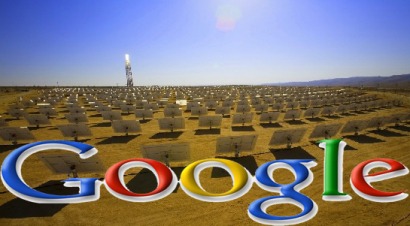
The renewable energy sector is taking a battering from all sides of late. Supporters of dirty fuels are claiming oil supplies are far from running out thanks to vast untapped reserves of shale oil, while natural gas proponents argue that it is a cheaper, “low carbon” alternative to renewables, and the nuclear industry continues to focus on renewable energy’s weak point: its intermittent nature. Even royalty is sticking their oar in, with Prince Philip, the Queen of England’s husband, reportedly describing wind farms as “utterly useless”; a view publically supported by the UK’s Former Chancellor, Lord Lawson.
Against this backdrop, the last thing the sector needs is for longstanding supporters of renewables to begin baulking at the costs of developing these new technologies during these austere times. Yesterday’s news that Google was to pull the plug on its programme to drive down the cost of clean energy therefore came as a chilling reminder of the fragility of funding provision in the sector.
Urs Hölzle said in a blog entry yesterday that Google was “in the process of shutting a number of products which haven’t had the impact we’d hoped for… and ending several which have shown us a different path forward”. While Google's senior executive was upbeat about the streamlining exercise, saying that it would “build a simpler, more intuitive, truly beautiful Google user experience”, it represents yet another blow to the renewables sector during what are challenging times.
Concentrating on solar power
The Renewable Energy Cheaper than Coal initiative was launched by Google in 2007 and involved the company making several investments in companies working on what it described as “potentially breakthrough technologies”. This including funding companies like Brightsource Energy and eSolar to help expand their work on concentrating solar power technology, and in Potter Drilling to advance its innovative geothermal drilling technology. Google also sponsored research to develop the first Geothermal Map of the US, helping better understand the potential for geothermal energy.
The internet giant even had a dedicated engineering team working to improve a type of concentrating solar power technology called the solar power tower, as well as investing $168 million in Brightsource’s Ivanpah Solar Electric Generating System: the world’s largest solar thermal power tower project under construction which is set to be completed in 2013. Google says that its Renewable Energy Cheaper than Coal engineering team focused their research on two areas of solar power technology (reducing the costs associated with heliostats, and reducing the cost and water consumption of the system) and has shown that overall costs could be brought down for this kind of technology.
Despite the company saying it is “excited” that some technologies are quickly approaching cost competitiveness with traditional forms of energy in parts of the US and the world, including solar thermal power, it hints that its loyalties are shifting towards solar photovoltaics, stressing that the installed cost of solar photovoltaic technology has declined dramatically over the past few years, making solar photovoltaic technology “a compelling choice for consumers”.
Google also reveals that it has reached a point in its engineering projects where it is facing “new challenges related to our solar receiver design”, and therefore argues that other institutions appear to be “better positioned to take this work to the next level”. With this in mind, it has decided to retire its engineering work on Renewable Energy Cheaper than Coal and share its key findings with the research and development community.
Sharing knowledge
The internet giant is now publishing its results “to help others in the field advance the state of this technology”, which include using smarter controls for solar tracking systems to boost performance at a lower cost; using a Brayton engine (a jet engine that uses solar energy to heat air and does not require spray cooling with water) to significantly reduce water use and possibly cut operating costs; and taking a system level approach to designing concentrating solar systems by focusing on the cost and quality of the system as a whole. On this latter point, Google says it tried to make cutbacks on some components, while compensating elsewhere to maintain performance, believing that this approach could reduce the cost of electricity generated by concentrating solar systems, rather than attempting to optimise each individual component, which can drive up overall costs.
“For the scientists and engineers out there, we’re publishing several technical papers so you can dig into the details and find out about our work,” says Google. “We are also working to publish the inventions that were developed during this research so the industry can continue to move the field forward.”
Despite Google mothballing this research, the company says it will continue its work to generate cleaner, more efficient energy, including procuring renewable energy for its data centres, making them even more efficient and investing more than $850 million in renewable energy technologies.
For additional information:

